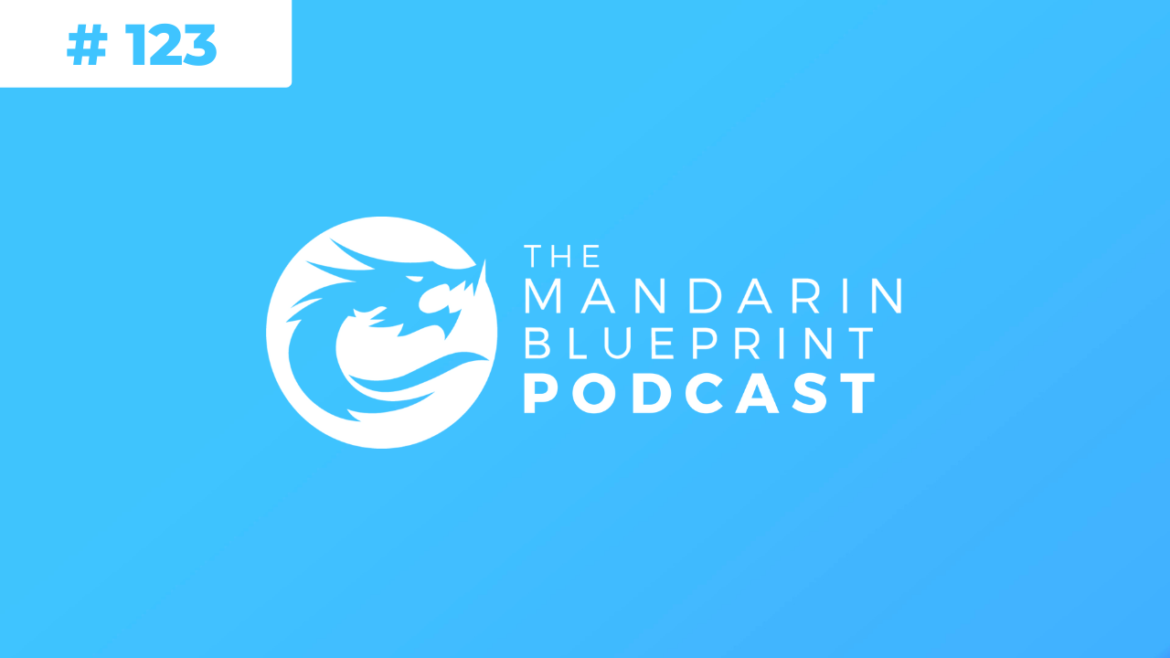欢迎光临! Welcome!
You can now subscribe to the podcast by the links below, or you can subscribe by copying the following URL into your favorite podcast APP.
The Mandarin Blueprint Podcast focuses primarily on The Blueprint online curriculum. Creators Luke Neale & Phil Crimmins answer questions and comments, discuss topics related to China and Mandarin learning, and have special guests.
Want to learn how to speak fluent Chinese fast? Join our free Webinar right here.
欢迎光临! Welcome!
You can now subscribe to the podcast on iTunes, Stitcher, Spotify, or you can subscribe by copying the following URL into your favorite podcast APP:
https://www.mandarinblueprint.com/feed/podcast/
The Mandarin Blueprint Podcast focuses primarily on The Mandarin Blueprint Method online curriculum. Creators Luke Neale & Phil Crimmins answer questions and comments, discuss topics related to China and Mandarin learning, and have special guests.
0:00 Affiliate Link & Reviews
Become a Mandarin Blueprint Affiliate
Leave us a Google Business Review 🙂
3:09 Comments & Emails
Santino Banks by Community
Hey everyone,
I’m halfway through level 14 and I’m picking up the sentence reading quite well, but I’m just wondering how long I should be staying on each sentence to perfect it orally?
I’m not too sure if this is just an exercise to get used to reading and understanding Chinese or I’m supposed to be working on my spoken Chinese too?
I’m spending quite a bit of time on them and I’m worried that this might not be the time for it yet and I could just be slowing my course progress down…
5:56
Vila Ruawai on Unit 3 Wrap-Up
Oh yes, thanks guys. By the way, I am really enjoying the course so far. Anki is a little challenging but the more I use it the more I’m beginning to like it.
Chur V
6:32
Soren Korsbaek on Vocab Unlocked from 排
I’m still a bit haunted by the lack of translations for a lot of sentences.
“排除不来的人,还有多少人?” – Google Translate: “How many people can’t be excluded?”
My expected meaning of this would be something more along the lines of “excluding the people that didn’t come, how many are we”?
I guess you can kind of interpret the Google Translation in that way too, at least there isn’t a direct contradiction. When I encounter these types of sentences I tend to focus solely on the meaning of the word/character the sentence is structured around learning whilst ignoring the sentence as a whole. This is obviously a small minority as most of the sentences are quite straight forward which is amazing to experience!
10:15
Alex Sumray on Vocab Unlocked from 神
Does anyone know the story behind 神马?
I imagine it’s a jokey thing used on WeChat between the younger generations, or is there a deeper meaning?
12:35
John Nomura on 和 in Context
I can see why you say reading these can become addictive
13:20
Kevin Roy Jackson on Make a Movie 香
Nice T-Shirt Phil. Do you have any plans for ‘merch’?
15:22
Jeff Johnson on 怕 in Context
我的马很吓人。
我的儿子很怕我。When I come to these sentences I always get mixed up between 吓 and 怕.
16:56
Scott Eisenmann on Problem Initial CHI: 吃 chī,好吃 hǎochī,吃饭 chīfàn, 吃饭了吗? chīfàn le ma?
Almost 20 years ago, my wife and I taught English and computer classes at a private university in Yanjiao, a suburb of Beijing. We were there for about a year and learned enough Chinese to shop, order food at a restaurant, and talk to taxi drivers…well, at least a little bit. They seemed to appreciate that we were trying to speak Chinese, even if they only
understood a few words that we said.Anyway, a Chinese friend told us that rice is more common in southern China, but noodles and bread are more common in the north. If I remember correctly, we mostly ate noodles, but seldom ate rice.
They called the bread miànbāo and noodles miàntiáo, but pronounced it miàntiá’r. That strong R sound at the end of words was so common around Beijing. Someone told us that it was the local dialect called Beijinghua.
I have forgotten most of the Chinese I learned back then, so I’m looking forward to relearning what I lost and learning even more. Loving the lessons so far. 谢谢 !
20:57
Jonathan Glazier on Vocab Unlocked from 现: 现在 – 发现 – 现金
发现 seek and ye shall find = send currently
23:31
Jason Pon on Vocab Unlocked from 进: 进来 – 进步 – 进一步 – 进去
进步
I thought of notable historical figures who have contributed to the progression of our society, more specifically on a technological idea to also be in line with the idea of ‘advancing and improving’. So I chose a picture of Henry Ford standing in front of a Form Model T进一步
I thought Neil Armstrong… ‘That’s one small step for man. One giant leap for mankind’!
26:39
Rick Angleland on Make a Movie 某
I’ve seen 某某 to mean “so-and-so”/”such-and-such” i.e. fill in whatever you want. I think I’ve also heard “什么什么“. What would be the commonest fill-the-gap expression?
28:30 Movies!
This blog post explains the theory behind Movie Scenes and learning characters.
Alex Sumray on Make a Movie 甫
So having misunderstood the keyword, I asked my mum what associations she has with Barley (as in the grain). She responds Indonesia thinking I said Bali. I’ve now just made a scene for Barely the grain instead of barely the adverb… think it’s time to stop for the day!
29:19
Will Raley on Make a Movie 济
KEYWORD: 济 jì Aid
Actor: ji-
Set: -Ø
Room within Set (tone): Bathroom
Prop(s): 氵 (Water Bottle), 齐 (Man on Stilts)Make a movie:
1. ji- at -Ø’s Bathroom
2. ji- spills her Water Bottle (氵) on the floor
3. ji- does not want to get her feet wet, so she backs against the wall, yet she is now surrounded by the water, ji- needs AID
4. A Man on Stilts (齐) comes to her AID
5. Man on Stilts picks ji- up and takes her across the Water Bottle’s water to the Bathroom’s exit
6. ji- looks so relived Man on Stilts came to her AID (济)
31:25
Will Raley on Make a Movie 剂
KEYWORD: 剂 jì Chemical Agent (solo chemical, not like a mixture)
Actor: ji-
Set: -Ø
Room within Set (tone): Bathroom
Prop(s): 齐 (Man on Stilts), 刂 (Broad Sword)Make a movie:
1. ji- at -Ø’s Bathroom
2. Man on Stilts comes to attack ji-
3. ji- gets her Broad Sword and slices Man on Stilts
4. A strange CHEMICAL AGENT bleeds out of the Man on Stilts
5. This CHEMICAL AGENT is like acid that melts through the Bathroom floor like in Alien movies



